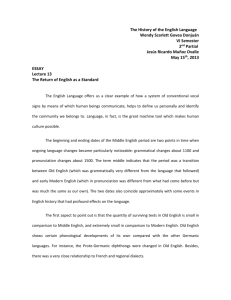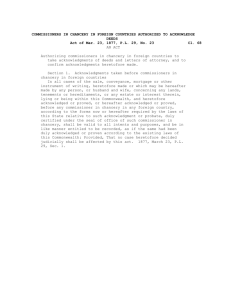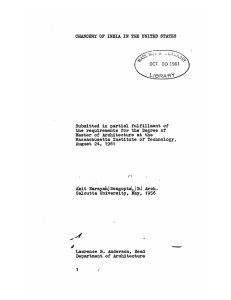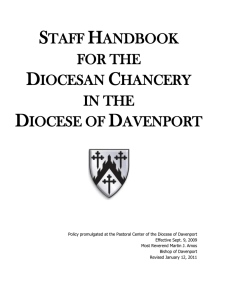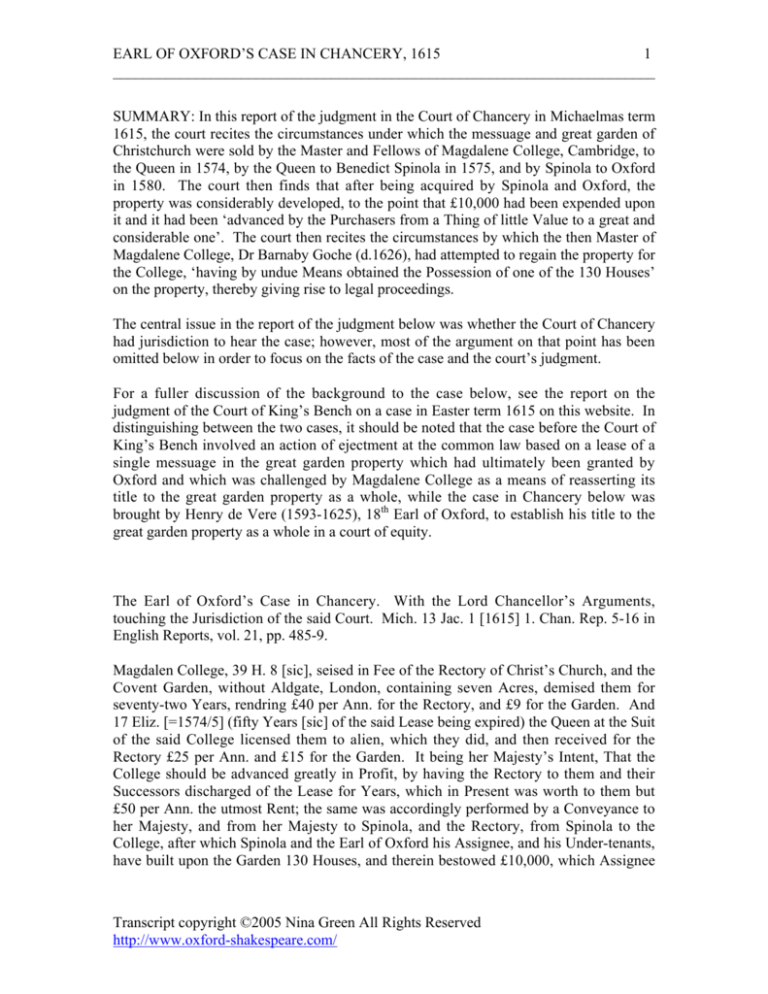
EARL OF OXFORD’S CASE IN CHANCERY, 1615
1
________________________________________________________________________
SUMMARY: In this report of the judgment in the Court of Chancery in Michaelmas term
1615, the court recites the circumstances under which the messuage and great garden of
Christchurch were sold by the Master and Fellows of Magdalene College, Cambridge, to
the Queen in 1574, by the Queen to Benedict Spinola in 1575, and by Spinola to Oxford
in 1580. The court then finds that after being acquired by Spinola and Oxford, the
property was considerably developed, to the point that £10,000 had been expended upon
it and it had been ‘advanced by the Purchasers from a Thing of little Value to a great and
considerable one’. The court then recites the circumstances by which the then Master of
Magdalene College, Dr Barnaby Goche (d.1626), had attempted to regain the property for
the College, ‘having by undue Means obtained the Possession of one of the 130 Houses’
on the property, thereby giving rise to legal proceedings.
The central issue in the report of the judgment below was whether the Court of Chancery
had jurisdiction to hear the case; however, most of the argument on that point has been
omitted below in order to focus on the facts of the case and the court’s judgment.
For a fuller discussion of the background to the case below, see the report on the
judgment of the Court of King’s Bench on a case in Easter term 1615 on this website. In
distinguishing between the two cases, it should be noted that the case before the Court of
King’s Bench involved an action of ejectment at the common law based on a lease of a
single messuage in the great garden property which had ultimately been granted by
Oxford and which was challenged by Magdalene College as a means of reasserting its
title to the great garden property as a whole, while the case in Chancery below was
brought by Henry de Vere (1593-1625), 18th Earl of Oxford, to establish his title to the
great garden property as a whole in a court of equity.
The Earl of Oxford’s Case in Chancery. With the Lord Chancellor’s Arguments,
touching the Jurisdiction of the said Court. Mich. 13 Jac. 1 [1615] 1. Chan. Rep. 5-16 in
English Reports, vol. 21, pp. 485-9.
Magdalen College, 39 H. 8 [sic], seised in Fee of the Rectory of Christ’s Church, and the
Covent Garden, without Aldgate, London, containing seven Acres, demised them for
seventy-two Years, rendring £40 per Ann. for the Rectory, and £9 for the Garden. And
17 Eliz. [=1574/5] (fifty Years [sic] of the said Lease being expired) the Queen at the Suit
of the said College licensed them to alien, which they did, and then received for the
Rectory £25 per Ann. and £15 for the Garden. It being her Majesty’s Intent, That the
College should be advanced greatly in Profit, by having the Rectory to them and their
Successors discharged of the Lease for Years, which in Present was worth to them but
£50 per Ann. the utmost Rent; the same was accordingly performed by a Conveyance to
her Majesty, and from her Majesty to Spinola, and the Rectory, from Spinola to the
College, after which Spinola and the Earl of Oxford his Assignee, and his Under-tenants,
have built upon the Garden 130 Houses, and therein bestowed £10,000, which Assignee
Transcript copyright ©2005 Nina Green All Rights Reserved
http://www.oxford-shakespeare.com/
EARL OF OXFORD’S CASE IN CHANCERY, 1615
2
________________________________________________________________________
and his Under-tenants have Bonds and Security given for the Enjoyment thereof, to the
Sum of £20,000.
Note; The College is hereby advanced £1700 more than they should have been, if the
former Lease had continued, which is not yet expired.
This Conveyance having been in Peace forty Years, and thus advanced by the Purchasers
from a Thing of little Value to a great and considerable one; and it being a general Case
wherein Persons of all degrees and Callings have made Purchases, they resting secure on
its Passing thro’ the Crown, the greatest Protection.
The present Master of the College having by undue Means obtained the Possession of one
of the 130 Houses, whereof one Castillion was Lessee, who being secure of his Title both
in Law and Equity, sealed a Lease thereof for three Years to one Warren, who thereupon
brought an Ejectment against one John Smith, for Trial of the Title in B.R. wherein a
Special Verdict was had; and while that depended in Argument the Lease ended, and so
no Possession could be awarded for the Plaintiff, nor Fruit had of his Suit.
Yet he proceeded to have the Opinion of the Judges to know the Law (which was a
voluntary Act of his), to the Intent, if the Law were with him, he might begin a new Suit
at Law, and spare to proceed in Equity; and if the Law were against him, that then he
might proceed in Chancery. And the Judges of that Court having delivered their
Opinions against his Title, before any Judgment entred upon the Roll, the Earl and Mr.
Wood, for themselves and their Lessees, preferred their Bill in Chancery; and then
Judgment was entred, Quod Querens nil capiat per Billam.
To which Bill in Chancery the Defendant put in a Plea and Demurrer, alledging the
Conveyance to be void by the Statute of 13 Eliz. and that they evicted one House, Parcel
of the Premisses by Judgment at Law; which Plea and Demurrer were referred by Order
to Sir John Tindal and Mr. Woolridge, who reported, That they thought it fit the Cause
should proceed to Hearing, notwithstanding the Plea and Demurrer; and afterwards in
Default of an Answer an Attachment was awarded against the Defendants, whereupon
they were attach’d, and a Cepi Corpus return’d, and by Order of the 22d of Octob. 13 Jac
1 [1615], they were committed to the Fleet for their Contempts in refusing to answer; and
do now stand bound over to answer their Contempts, they still refusing to answer.
And now this Term it was argued, That the Defendants thus standing in Contempt, &c.,
may be sequestred until Answer.
1. The Law of God speaks for the Plaintiff. Deut. 28.
2. And Equity and good Conscience speak wholly for him.
3. Nor does the Law of the Land speak against him. But that and Equity ought to join
Hand in Hand, in moderating and restraining all Extremities and Hardships.
By the Law of God, he that builds a House ought to dwell in it; and he that plants a
Vineyard ought to gather the Grapes thereof; and it was a Curse upon the Wicked, that
Transcript copyright ©2005 Nina Green All Rights Reserved
http://www.oxford-shakespeare.com/
EARL OF OXFORD’S CASE IN CHANCERY, 1615
3
________________________________________________________________________
they should build Houses and not dwell in them, and plant Vineyards and not gather the
Grapes thereof. Deut. 28. v.30.
And yet here in this Case, such is the Conscience of the Doctor, the Defendant, That he
would have the Houses, Gardens and Orchards, which he neither built nor planted; But
the Chancellors have always corrected such corrupt Consciences, and caused them to
render quid pro quo; for the Common Law it self will admit no Contract to be good
without quid pro quo, or Land to pass without a valuable Consideration, and therefore
Equity must see that a proportionable Satisfaction be made in this Case. . . .
And (his Lordship) the Plaintiff in this Case only desires to be satisfied of the true Value
of the new Building and Planting since the Conveyance, and convenient Allowance for
the Purchase. . . .
Transcript copyright ©2005 Nina Green All Rights Reserved
http://www.oxford-shakespeare.com/

